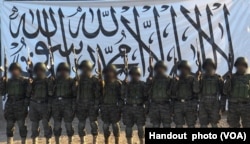A Taliban suicide raid on a major military base in northern Afghanistan is reported to have left at least 140 people dead, mostly soldiers, in the deadliest attack on Afghan forces since 2001.
Witnesses said a group of 10 heavily armed suicide bombers aboard two army vehicles and disguised as government soldiers stormed the Afghan National Army’s 209th Shaheen Corps Headquarters Friday in Mazar-i-Sharif, the capital of the northern Balkh province.
Local television stations quoted an unnamed security official and regional politicians Saturday as saying that “at least 140 soldiers were killed in Friday afternoon’s attack… and at least 100 soldiers were also wounded.”
Survivors being treated at a city hospital told local TOLOnews TV they believed without “inside help” it would not have been possible for the attackers to make their way to the center of the heavily fortified military base where the mosque is located.
“We are soldiers from the corps but we cannot enter the base easily, but it is unfortunate that suicide bombers managed to enter the base easily. My foot was wounded in this incident,” a wounded solider identified as Lotfullah told the private television station.
According to local officials, one group of Taliban assailants sprayed Afghan soldiers with bullets as they were leaving a mosque following afternoon prayers, while another group stormed a dining facility at the military compound before Afghan commandos surrounded and engaged them in fierce gun-battles.
Taliban takes credit
A Taliban spokesman, Zabihullah Mujahid, swiftly took credit for the attack. He released fresh details to reporters on Saturday along with a picture of the purported bombers. Mujahid claimed the siege lasted for ten hours and “up to 500 enemy soldiers were killed and wounded, including key officers.”
The spokesman said the deadly raid was a retaliation for the recent killings of Taliban shadow governors for the neighboring Kunduz and Baghlan provinces along with a number of colleagues by U.S. backed Afghan forces.
He warned that Friday’s attack on the army headquarters in Balkh is “a message for all the enemy soldiers, police, intelligence operatives and relevant (Afghan) institutions that this year’s (Taliban) operations will be more brutal and painful for them.”
Separately, the U.S. military confirmed Saturday the killing of top Taliban commander in an airstrike this week. An official statement identified the slain man as Qari Tayyib, once known as the Taliban’s shadow governor of the northern Takhar province. It said the strike at Qari's compound in the nearby Kunduz province also eliminated eight Taliban fighters.
“Tayyib had been a target-of-interest since 2001 and was directly responsible for the deaths of U.S. service members in Afghanistan,” according to the U.S. military.
Meanwhile, U.S. Central Command spokesman Colonel John Thomas described the incident as a "significant attack from enemy forces" and said "we are helping the Afghan forces in any way that we can.”
The Afghan military base that came under attack on Friday houses tens of thousands of soldiers who are regularly engaged in anti-Taliban operations in troubled northern regions of the country.
Military advisers and trainers from NATO's U.S.-led Resolute Support mission in Afghanistan are also stationed at the base. But there were no reports of foreign troop casualties.
A presidential spokesman confirmed to VOA President Ashraf Ghani left Kabul for Mazar-i-Sharif on Saturday to discuss and review the post-violence situation with provincial authorities. Ghani visited wounded soldiers shortly after arriving in the city.
Friday’s attack followed U.S. National Security Adviser H.R. McMaster’s first visit to Kabul earlier this week where he vowed to strengthen the call for defeating Taliban insurgents on the battleground who refuse to join an Afghan government-led peace process.
The attack on a highly secured Afghan military facility has refueled criticism of the government’s security measures and its policy in tackling the resurgent Taliban.
Bombing in November
Afghan security forces have suffered massive casualties since U.S.-led foreign combat troops left Afghanistan in 2014. In the first eight months of 2016, insurgent attacks killed close to 7,000 Afghan security forces, according to figures local officials shared with the U.S. military.
A truck bombing this past November in the provincial capital targeted the German consulate, killing six Afghans and injuring more than 100 others.
Friday's insurgent assault was the deadliest since April 2016, when Taliban suicide bombers stormed an office of the Afghan intelligence agency in Kabul, killing at least 60 people.
The latest violence came a month after suicide bombers assaulted the country's largest military hospital in the Afghan capital, killing about 40 people and wounding dozens more. Doctors and soldiers were among the victims.
That attack was claimed by loyalists of the Islamic State in Afghanistan.
Ekram Shinwari in Kabul, Afghanistan, contributed to this report.





